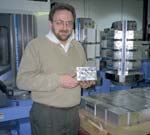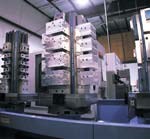Workholding Provides Maximum Versatility For Unattended Machining
This company manufactures a broad line of custom manifold assemblies used in all types of fluid power applications such as off-highway vehicles, tractors and road graders. These manifolds are made from 6061 aluminum and are finish machined in a wide range of sizes and with numerous SAE ports, valve cavities and threaded holes, some with precision features designed to handle various fluid power components.
Share




JEM Technical Marketing (Long Lake, Minnesota) manufactures a broad line of custom manifold assemblies used in all types of fluid power applications such as off-highway vehicles, tractors and road graders. These manifolds are made from 6061 aluminum and are finish machined in a wide range of sizes and with numerous SAE ports, valve cavities and threaded holes, some with precision features designed to handle various fluid power components.
These manifold assemblies are manufactured for large OEM applications but are also available for limited application use. Part runs vary from just one to well over 3,000 units with the required machining accuracies ranging from 0.0005 to 0.001 inch. To achieve real production efficiency with this diverse product mix, JEM decided something had to be done with its workholding to maximize productivity.
The company began using a new model of cluster towers from Kurt Manufacturing (Minneapolis, Minnesota) with mating serrated mounting surfaces. "Our precision manifold machining process is all about high density," says Peter Tackes, manufacturing manager for JEM. "We've taken a two-station-per-face setup and gone to four. That doubles the capacity of each tower setup. It allows our operators to set up off-line enough parts to run unattended through the night." With enhancements to its high density workholding, JEM is able to double the parts it holds in its Cluster Tower setups to keep its new machining center turning unattended for an extra 7-hour shift in every 24 hour workday.
From a distance, it appears that those towers are the ones that have been around for years. But a closer look unveils something different and entirely new—the surface of these mounting plates is serrated. That is, the surface is lined with V-shaped grooves and ridges that are plainly visible running across the plates. These new towers, called SeraLock, have the usual four sides of the mounting fixture. Each side of the pedestal features ductile iron mounting plates with two vertical T-slots.
What is not visible are the matching grooves and ridges on the mating surfaces of the fixture blocks clamped to the mounting plates. The grooves and ridges on these mating surfaces are precisely shaped and spaced so that the match between the surfaces is nearly perfect. When these opposing grooves and ridges come together, they interlock, forming a rigid, firm and level interface, making subsequent re-clampings highly repeatable.
Originally designed for two workholding stations per face, JEM sets up its SeraLock cluster towers with three and sometimes four workholding stations per facing. "It all depends on the size of the part," says Mr. Tackes. "If the part height is sufficiently narrow, we'll stack up to four parts per facing. Alignment of three or four side-by-side parts would be difficult to achieve using conventional cluster towers but not with the new Kurt SeraLock setup."
Incorporating Kurt's MoveLock module, JEM's workholding is an entirely new approach. The MoveLocks are simple, two-piece vises that provide independent mounting of stationary and moveable elements in the setup. What's different in this setup are the intermediate modules, or the combination spacer/lockdown devices, which are positioned between each of the workholding stations. They have the dual function of aligning, holding and locking down the parts to be machined. But it's all made possible with the Kurt SeraLock mounting platform. JEM's setup maximizes the workholding in the space available on each mounting face. But the key to the system is in the accuracy of the serrations, both in form and in spacing.
JEM finds that repeat setups are easy because the SeraLock serrations take care of location and alignment of clamping elements. And because of the versatility inherent in the system, setups ranging from high density loads of small parts to single station configurations for very large workpieces can be accommodated on the same workholding surface.
Mr. Tackes says that the system has helped triple output in this nine-person machining department without adding more help. "We keep the machines running with operator attention and setup through the end of the second shift. Toward the end of that shift, around 11 p.m., the operator carefully checks the first run of parts. If all check out, and they usually do because we've done our setup homework, they'll be machined to spec without operator attention during the 11 to 6 shift."
"Most of the ‘lights out' part runs are from just a single part to 100," Mr. Tackes says. "The machining is done at spindle speeds up to 12,000 rpm with tolerances from 0.0005 to 0.001 inch. This process requires very skilled operators who understand programming and managing the machines correctly. The SeraLock towers have really made a difference in our productivity. They help us improve our just-in-time response because with our product lines, customers are constantly changing their requirements."
An additional benefit Mr. Tackes notes since adopting the Kurt SeraLock Tower setup with the Mazak Palletech system is the need for less machine floor space. Output has been tripled, and three older machining centers re-assigned to other uses, leaving room to add more off-line loading capability to the one machine or integrating a second machine into the system.
Read Next
Setting Up the Building Blocks for a Digital Factory
Woodward Inc. spent over a year developing an API to connect machines to its digital factory. Caron Engineering’s MiConnect has cut most of this process while also granting the shop greater access to machine information.
Read MoreBuilding Out a Foundation for Student Machinists
Autodesk and Haas have teamed up to produce an introductory course for students that covers the basics of CAD, CAM and CNC while providing them with a portfolio part.
Read More5 Rules of Thumb for Buying CNC Machine Tools
Use these tips to carefully plan your machine tool purchases and to avoid regretting your decision later.
Read More



















.png;maxWidth=300;quality=90)












